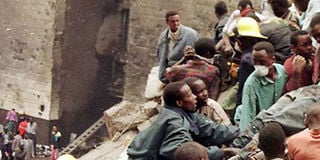Former US envoy Bushnell still tormented by Nairobi blast

A file picture taken on August 7, 1998 shows civilians and firemen working to remove the bodies of people who died when a bomb exploded at the US embassy in Nairobi. More than 200 people died. PHOTO | ALEXANDER JOE | AFP
What you need to know:
- Ms Bushnell said had repeatedly and vehemently urged US security officials to install stronger defences at the embassy.
- Ms Bushnell said corruption and political violence remain common in today's Kenya.
NEW YORK
Kenya's August 8 elections so preoccupied the country that little attention was paid to the previous day's 19th anniversary of the US embassy bombings in Nairobi and Dar es Salaam.
But August 7, 1998 remains painfully embedded in the lives of all who survived attacks that killed a total of 200 Kenyans, 12 Americans and 10 Tanzanians.
TRAUMA
Among those annually reliving the horror is Prudence Bushnell, then the US ambassador to Kenya.
And her trauma is compounded by awareness that the Nairobi bombing could have been prevented — or its impact at least could have been lessened — had her pleas and warnings been heeded by officials in Washington.
Ms Bushnell, now retired from the US Foreign Service, recounts the attack as well as its prelude and aftermath in an as-yet-unpublished memoir entitled Rattling Teacups: An Ambassador's Story.
The title can be read two ways.
MEETING
It refers to the literal shaking of tea service, which she remembers as an oddly vivid detail of the massive explosion near the embassy's entrance.
Taking part in a top-floor meeting in the adjoining Cooperative Bank House, Ms Bushnell was thrown to the floor as flying glass lacerated her face and hands.
“Rattling Teacups” might also be taken as a metaphor for Ms Bushnell's undiplomatic dealings within the State Department and with then-President Daniel arap Moi.
SECURITY
She had repeatedly and vehemently urged US security officials to install stronger defences at the embassy, which fronted on Moi Avenue.
Her entreaties brought no results.
“Congress had starved the State Department of money for many years,” Ms Bushnell said in an interview with the Sunday Nation.
“There was no money to do what needed to be done.”
CLINTON SCANDAL
Even afterwards, the attack did not produce much response, she noted.
“The bombing occurred at the time of a political scandal in Washington involving Bill Clinton and [White House intern] Monica Lewinsky,” Ms Bushnell said.
“We got coverage for three or four days. Then the world and Washington moved on.”
The US Congress never held a hearing on the destruction the Kenya and Tanzania diplomatic compounds, nor did the Clinton administration carry out a formal “after-action review”, she added.
FRICTION WITH MOI
Ms Bushnell's difficulties with Mr Moi predated their first direct encounter.
“He wouldn't see me for three months after I arrived,” she recounted.
“He didn't say so, but he was displeased that the US had appointed a woman to succeed a female ambassador [Aurelia Brazeal, who held the post from 1993 to 1996].”
When they finally met, the envoy and the president “argued an enormous amount”, Ms Bushnell recalled.
CORRUPTION
She was pushing, she said, for action on corruption and political violence, while Mr Moi “kept saying 'Americans don't understand Africa — don't understand that the people love me'".
Corruption and political violence remain common in today's Kenya, Ms Bushnell said.
She also acknowledged the country's economic gains in the past 20 years.
“I hope,” she added, “that Kenyans will soon get the system they deserve — political figures who respect the rule of law, the electoral process and the rights of people who may not have vetoed for them”.
RECOMPENSE
Kenyans have also yet to receive warranted compensation for the injuries and losses some of them sustained in the bombing, Ms Bushnell said.
The US did supply Kenya with more than $40 million (Sh4bn) to cover victims' medical expenses and to provide humanitarian assistance.
But that response has not satisfied many of the Kenyans who suffered injuries or personal losses in the attacks.
They continue to press for personal compensation through lawsuits filed in US courts.
THERAPY
Ms Bushnell, 70, has herself received no compensation for injuries and trauma.
She said she had to pay for therapy out of her own pocket.
After leaving Kenya, Ms Bushnell served as US ambassador to Guatemala from 1999 to 2002.
She was pushed out of that post, she explains in the memoir, because she continued to complain, as in Kenya, about embassy conditions.
TRUMP REIGN
Ms Bushnell remains outspoken.
She said in the August 16 interview that she is “appalled” by President Donald Trump's performance.
US foreign policy, she noted, is supposed to resemble a stool resting on three legs of defence, development and diplomacy.
“Take away two of those legs and the stool falls,” Ms Bushnell said.
She predicted a bleak future for a US policy in Africa based solely on military might.
“Rattling Teacups” is expected to find a publisher prior to next year's 20th annniversary of the attack that profoundly affected Ms Bushnell's life as well as her career.




